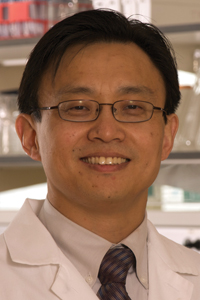 |
Jialin Zheng, M.D. |
NOTE: This profile is part of a series highlighting the 23 researchers who were named UNMC Distinguished Scientists or New Investigators for 2008. Each of these researchers will be profiled in UNMC Today leading up to a Monday ceremony to recognize their achievements.
- Name: Jialin Zheng, M.D.
- Title: Professor of pharmacology and experimental neuroscience and pathology and microbiology
- Joined UNMC: 1993
- Hometown: Dongtai City, China
Describe your research in laymen terms, please.
The laboratory focuses on the effects of brain inflammation on neuronal injury and changes in neural stem/progenitor cell proliferation, migration, differentiation and survival during brain disorders.
What led you to pursue this area of research?
When I was in medical school, “Black box” expression about the brain made me curious. The training and great examples of my mentors provided me with the skills, knowledge, courage and spirit to be deeply involved in investigating this important issue. The challenge remains the same and I am glad my students and many others have the same curiosity.
How do you see your research contributing to science?
Identification of the pathways by which neuronal injury and changes in neural stem/progenitor cells occur during brain inflammation will eventually lead to further understanding of brain disorders such as dementia. This will lead to potential new therapies for these diseases and will require a big team effort among the neuroscience community.
Why did you become a scientist?
My first graduate school project was about “receptors,” which were like “lockers” and I needed to find the right “key” for them. I have been searching for many “keys” for different “lockers” and sometimes the search leads to nothing, but when you open one door, a new door is always waiting for you. It has been a mixture of excitement and challenge.
What is your hope for the next generation of scientists?
Interest, motivation, team effort and perseverance are keys for success. I have learned and continue to learn a great deal from my mentors, superiors, my students and others around me. I always remind myself that everyone is valuable and no one is perfect.
Beyond grant funding, how do you measure success?
I always like to remind the students and laboratory members — it is not important for you say you are good, it is important for others to say you are good. More importantly, when others who are more successful compliment your own work and reference it, that, to me, is most meaningful.
What would you tell a student interested in a research career?
Sustained interest is the key. This and perseverance keeps you going.
Do you have a hero/role model? If so, what do you admire most about this person?
I have many heroes and role models, which makes it hard to identify all of them. One great example would be my doctor adviser in Shanghai, Prof. Zheng-Jun Jin who taught me “it is not only important to be a great scientist, but also to be a great person.” He died from cancer two years ago when he was 78. He was still giving lectures to students before he was sent to the hospital. All my heroes/role models have great vision, strong spirit and a great heart to help others.
Tell us about your family and hobbies outside of the lab.
My wife, Gwen, is a family medicine resident who was ranked higher in medical school than me. My son, Kevin, is a freshman at Rochester University in New York. My daughter, Katie, is in sixth grade. She is a volleyball player and is expected to be taller than me. My mother also lives with us, which has been a big help.
Both of my children play beautiful piano. I also like to fish and play ping-pong.
List three things few people know about you.
- I like to sing karaoke in Chinese;
- I used to write Chinese calligraphy; and
- My middle legal name is “Charlie” but I like to go by “Chuck.”